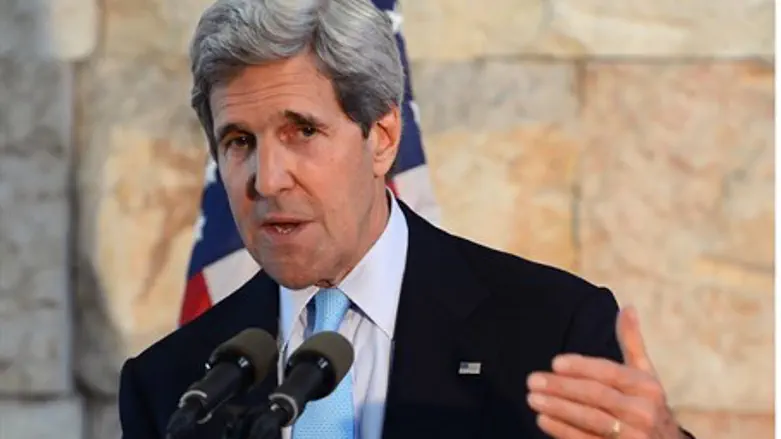
US Secretary of State John Kerry will present a framework deal at the end of January, according to London-based Arabic news outlet Al Hayat Saturday, at a conference in the Jordanian city of Aqaba.
Palestinian Authority (PA) sources told the daily that the presentation will only include an outline of the interim agreement's terms; both sides are due to cement the details of an agreement before April 2014.
Kerry will reportedly present the agreement in Aqaba, at a summit hosted by Jordan's King Abdullah II. The report stated that Jordan would have a hand in finalizing the terms of an agreement, but also that “control over the border and natural resources will effectively remain in Israel's hands."
Deputy Defense Minister Danny Danon confirmed the reports to IDF Radio Saturday, stating that Kerry would return to the region in two days - to promote, in part, a meeting between Prime Minister Binyamin Netanyahu and PA Chairman Mahmoud Abbas under Jordanian sponsorship.
Danon also stated to the radio station that he hopes that Israel will not agree to withdraw to 1949 Armistice lines - and that if Netanyahu does, or makes any concessions regarding Jerusalem, he would face stiff opposition from within his own Likud party.
Jordan's involvement in talks only surfaced in the past several weeks. The state has become a meeting place for discussions over talks, with Kerry, Abbas, and Netanyahu each meeting there to discuss the talks with Abdullah II.
Abbas met with Amman earlier this month, ostensibly to "clarify the Jordanian-Palestinian position" over talks - as well as Kerry's role.
"Kerry is still providing ideas, which we are discussing. He will come again soon. We continue to meet with his aides until ideas mature and before he comes up with a framework for the agreement," Abbas stated.
Netanyahu made a last-minute trip to Amman Thursday, meeting with Abdullah II over the peace talks.
The contents of both meetings were kept under wraps.
The US welcomed the move, and revealed that they had been aware of Netanyahu's trip.
“As you know, the Jordanians play an incredibly important and influential role, and they have historically, in the peace process as prominent members of the Arab League,” State Department spokesman Jen Psaki stated to reporters. “The Secretary has briefed King Abdullah and Foreign Minister Judeh countless times about what is happening on the ground. So we see that as a productive development.”
“We certainly were aware that they were planning to meet,” she stressed.
The PA insists on full control of the Jordan Valley – along with all other land that was under Jordanian control from 1948 to 1967 – while Israeli experts have warned that the area is strategically critical.
Recent reports indicated that Kerry was pushing the sides to agree to a deal that involves a slow transition from IDF patrols over the region to PA forces, with an international presence. IDF drones would also be deployed over the area, as a means of gathering information about potential terrorist activity.
Earlier this month, a close advisor to Abdullah II insisted that Jordan be involved in talks, stating that the potential deal between the PA and Israel could directly affect the security of neighboring state.
"Jordan needs to be present and involved in all future negotiations," former Prime Minister Marouf al-Bahit stated to al Hayat on January 3. "It is unthinkable that Jordan should sit on the side, as an observer. Jordan should join the negotiating table immediately - since it is bound to be the one paying the price of the Israeli and American positions."
In June, current Jordanian Prime Minister Abdullah Nasr declared that the peace talks would directly affect the diplomatic relationship between Jordan and Israel.
"We see the situation around us and the developments that occur before our eyes, and they only strengthen the belief that the peace process is the key to regional stability,” Nsur told Maariv then. “King Abdullah, U.S. envoy John Kerry and other international groups are working hard to promote the issue."
"If progress is made,” he added, “and there will be positive results on issues related to negotiations, Israel will instantly improve its relations with all Middle Eastern countries. I repeat again - the issue of talks between Israel and the Palestinians is the central issue which affects the relationship between Israel and Jordan.”